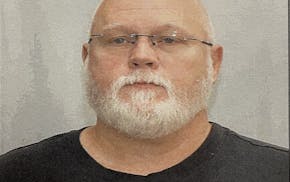Michael McGowan sees opportunity where others might see unoccupied land.
The second-generation landowner of a pair of inactive Burnsville dumps wants to build a Topgolf-style driving range and pickleball complex atop one of the expanses of buried trash. And he says he has an effective — and economical — proposition for cleaning up the site.
But the Minnesota Pollution Control Agency, which must approve McGowan's proposal, insists the plan doesn't address the danger the unlined dumps present to drinking water.
That's left McGowan frustrated with an agency he insists is thwarting his ambitions for a development that will benefit Burnsville residents, culminating in the latest spat between McGowan and the MPCA over cleaning up the aging sites.
"We believe that this does remediate the site, which has been a concern of the MPCA for many, many years," McGowan said of his plan for the sports complex.
McGowan insists the Freeway Dump and Freeway Landfill, so named because they abut Interstate 35W, won't contaminate drinking water that the cities of Burnsville and Savage pump from a nearby quarry to a treatment plant.
The MPCA disagrees, predicting that when the quarry, Kraemer Mining & Materials, one day stops pumping water that sustains its mining activities, the groundwater table will rise and soak the dumps. That will unleash a slew of contaminants into drinking water and the nearby Minnesota River.
"The development doesn't fix the underlying problem and the risk that's posed to groundwater," said Kirk Koudelka, the MPCA's assistant commissioner for land policy and strategic initiatives.
The MPCA is standing behind its own plans for remediation — and says it won't compromise with McGowan on its approach to cleaning up the site.
"We're not going to negotiate or water down the state standards," Koudelka said.
A long history
McGowan's father, Richard, began operating the Freeway Dump in the 1960s.
It closed in 1969, the same year the elder McGowan purchased four more properties that became the Freeway Landfill. Like other waste repositories of the era, the sites weren't lined, a status that scientists soon discovered could cause contaminants to leak into groundwater.
The Freeway Landfill stopped taking in trash in 1990, but the McGowan family continues to accept construction materials at the site, hiring a trucking firm to haul the debris to locations in Minnesota and Iowa.
The MPCA started monitoring the McGowan family business early on, suing Richard McGowan and his company in 1987 for costs associated with investigating toxic substances at the site.
Recent monitoring of the Freeway Dump has detected levels of per- and polyfluoroalkyl substances, or PFAS, that exceed state and federal standards, Koudelka said. Tests have also found other contaminants at the site, including benzene, vinyl chloride and 1,4-dioxane.
The prospect that those substances could further contaminate groundwater once the quarry closes — Koudelka said it's unclear when that will happen — has moved the MPCA to propose several options for protecting drinking water from contaminants in the Freeway properties.
Remediation plans
Koudelka said the agency asked McGowan to enter the Closed Landfill Program, which calls for the perpetual monitoring of such sites, but didn't hear back from him.
McGowan says his property is a bad fit for the program, and he worries it would erode his control over the land.
In recent years, the MPCA has presented two options for remediating McGowan's land.
One would excavate the waste from both Freeway properties and haul it to another landfill for final disposal. Another would supplant the Freeway Landfill with a modern landfill, then move the Freeway Dump waste to that site, priming the dump for a new purpose. Both would cost hundreds of millions of dollars.
The MPCA's insistence on these ideas has rankled McGowan and Bryan Murdock, an environmental consultant helping the property owner develop a remediation plan for the site.
McGowan insists that constructing the driving range and pickleball complex, called Suite Shots, will sufficiently clean up the dump. As part of the plan, workers will place some materials they excavate in a lined area beneath the driving range's layer of artificial turf.
A parking lot will pave over one-third of the property, while a lined retention pond will cover another third.
"So, in a sense, the entire facility will then be lined," said McGowan, who along with Murdock contends the MPCA is overstating the harms his properties pose to drinking water.
In Murdock's telling, contaminants at the Freeway properties won't pollute drinking water even if the water table rises, because flooding and saturation over the years have largely flushed the waste of harmful substances.
He also accused the MPCA of presenting the "absolute worst-case scenario" by highlighting chemical levels detected by wells located in the landfill's most contaminated areas.
Koudelka objected to Murdock's arguments, claiming that capping the waste and building on top of it won't prevent future groundwater contamination. And recent monitoring, Koudelka continued, shows flooding hasn't washed away the toxic chemicals.
"They are still [in] the landfill at very high and alarming numbers," he said. "Our concern is when Kraemer quarry stops pumping groundwater, flow is going to change, and it will adversely impact where [Burnsville and Savage are] pulling drinking water from."
Next steps
Despite the MPCA's objections, McGowan has nevertheless pushed ahead with efforts to drum up public support for his golf and pickleball project.
He has distributed glossy promotional materials to Burnsville residents, created a website to boost the idea and scored the support of the city's business community.
"That seemed like a great use," Burnsville Chamber of Commerce President Jennifer Harmening said of the Suite Shots idea. "With this being a former dump site, it's probably not a bad thing to do a new project on top of it."
City Council Member Dan Gustafson said he backs the idea to bring a sports complex to Burnsville, so long as the property owner secures approval from the state.
"We can't override the MPCA," he said.
That has proved challenging for McGowan, who wants an independent mediator to facilitate meetings with the state agency. Koudelka said he's happy to converse with the property owner, but he bristles at the idea of walking back the state's intensive plans for remediation.
Tests showing contaminants, Koudelka said, "aren't things that can be mediated or negotiated."
"What we can't change is what needs to be done to be protective there," he said.

Rain and cool weather help crews battle Camp House fire in northern Minnesota

Federal officials launch investigation into Mexican tall ship that struck Brooklyn Bridge

Pope Leo XIV vows to work for unity so Catholic Church becomes a symbol of peace in the world

Israel launches 'extensive' new ground operations in Gaza as airstrikes kill at least 103 people

